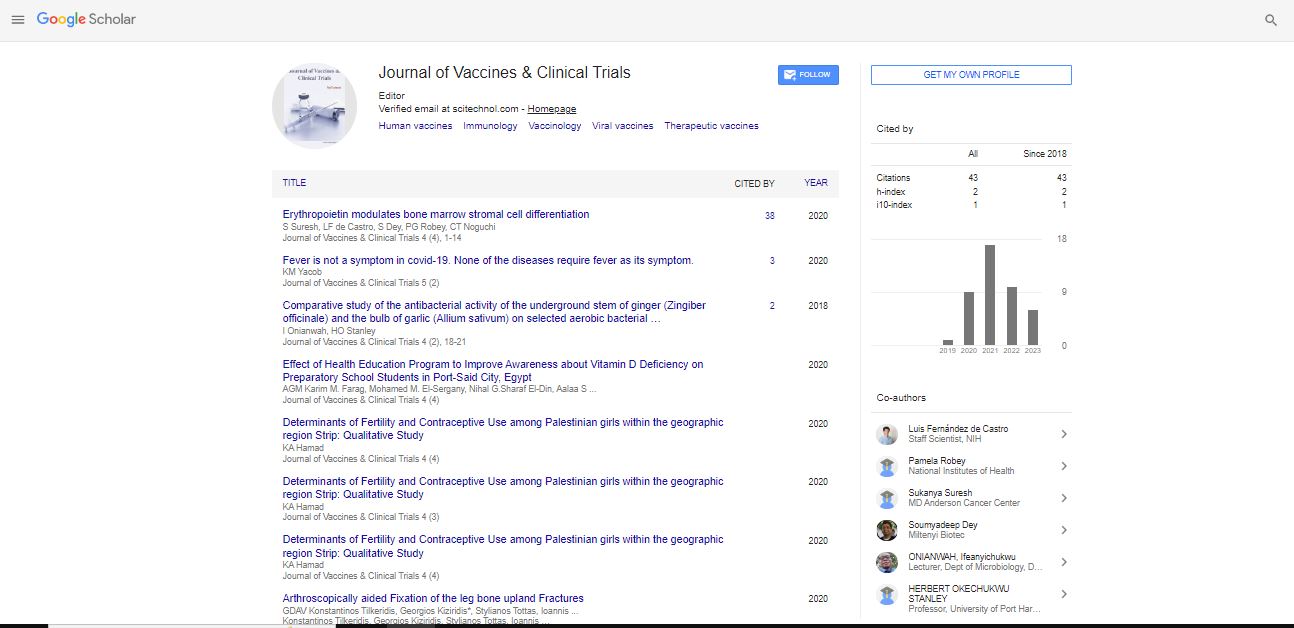Opinion Article, Jou Of Vac Cli Tr Vol: 7 Issue: 3
Vaccinating Against Viral Agents: A Vital Approach
Ageng Quintero*
1Department of Infectious Diseases, University of Pennsylvania, Philadelphia, United States of America
*Corresponding Author: Ageng Quintero,
Department of Infectious Diseases,
University of Pennsylvania, Philadelphia, United States of America
E-mail: agenquint@wustl.edu
Received date: 28 August, 2023, Manuscript No. JVCT-23-118130;
Editor assigned date: 31 August, 2023, PreQC No. JVCT-23-118130 (PQ);
Reviewed date: 14 September, 2023, QC No. JVCT-23-118130;
Revised date: 21 September, 2023, Manuscript No. JVCT-23-118130 (R);
Published date: 28 September, 2023, DOI: 10.4172/JVCT.100085
Citation: Quintero A (2023) Vaccinating Against Viral Agents: A Vital Approach. Jou of Vac Cli Tr 7:3.
Description
Vaccination stands as one of the most important and effective public health interventions in human history. It has saved countless lives, prevented devastating diseases and protected communities from the scourge of viral infections.
Vaccination, in its essence, is a deliberate introduction of a harmless form of a pathogen or a component of it, known as an antigen, into the body. This exposure prompts the immune system to recognize the antigen as foreign and generate a protective response without causing the disease itself. The body then learns to defend against the specific pathogen, generating immunity.
The primary objective of vaccines is to prevent diseases caused by viral agents. Viruses are unique among pathogens in their ability to rapidly infect and replicate within host cells, often leading to severe illnesses. Vaccines are engineered to stimulate the immune system, preparing it to respond robustly when confronted with the real viral threat. By introducing antigens mimicking the virus, vaccines effectively train the immune system to recognize and neutralize the pathogen upon future exposure.
Vaccination has achieved remarkable successes in combatting viral diseases throughout history. One of the most notable achievements is the eradication of smallpox, a deadly virus that once plagued humanity. Through a global vaccination campaign, the World Health Organization (WHO) declared smallpox eradicated in 1980. This monumental achievement remains a testament to the power of vaccines in eliminating a viral scourge from the face of the Earth.
Vaccinating against viral agents not only protects individuals but also contributes to the broader concept of herd immunity. Herd immunity occurs when a sufficient percentage of the population becomes immune to a disease, either through vaccination or prior infection. This reduced pool of susceptible individuals impedes the spread of the virus, providing indirect protection to those who cannot be vaccinated, such as individuals with certain medical conditions or weakened immune systems.
Herd immunity is especially important for protecting vulnerable populations. Some individuals, due to medical conditions or age, cannot receive certain vaccines, leaving them susceptible to severe infections. For example, infants and elderly individuals are particularly vulnerable to influenza, a viral disease that can be lifethreatening. Widespread vaccination not only protects these groups directly but also indirectly, as it reduces the overall transmission of the virus in the community.
The effects of viral diseases extend beyond individual health. They can strain healthcare systems, disrupt economies and lead to social and political instability. Vaccination programs play an essential role in mitigating these broader consequences. By preventing viral outbreaks and reducing the burden on healthcare infrastructure, vaccination fosters global well-being and economic stability.
Vaccination takes on even greater significance in the context of pandemics. The COVID-19 pandemic serves as a stark reminder of the vital role vaccines play in controlling the spread of highly contagious viruses. The rapid development, testing and distribution of multiple COVID-19 vaccines around the world demonstrate the adaptability of vaccination in responding to emerging threats.
Despite the undeniable benefits of vaccination, it is not without challenges. Vaccine hesitancy, fueled by misinformation and mistrust, poses a significant obstacle. Addressing these concerns and ensuring effective vaccine communication are important to sustaining vaccination rates and achieving herd immunity.
The field of vaccinology is continuously evolving. New vaccine technologies, such as messenger Ribonucleic Acid (mRNA) vaccines, offer innovative approaches to viral disease prevention. These developments have the potential to address not only current viral threats but also emerging diseases and those previously deemed challenging to vaccinate against.
Vaccinating against viral agents is not solely an individual choice but a collective responsibility. It is a duty to protect oneself and to contribute to the well-being of the community. When individuals opt for vaccination, they help establish a protective barrier against viral diseases, ultimately saving lives and preventing the spread of infections.
Conclusion
Vaccination against viral agents is an indispensable tool in preventing diseases, achieving herd immunity and promoting global well-being. It has a profound impact not only on individual health but on broader societal and economic stability. The COVID-19 pandemic has highlighted the adaptability of vaccinology in responding to emerging threats, emphasizing the need for public health efforts in this field. Vaccination is not only a personal choice but a collective commitment to a healthier and more secure world.
 Spanish
Spanish  Chinese
Chinese  Russian
Russian  German
German  French
French  Japanese
Japanese  Portuguese
Portuguese  Hindi
Hindi 